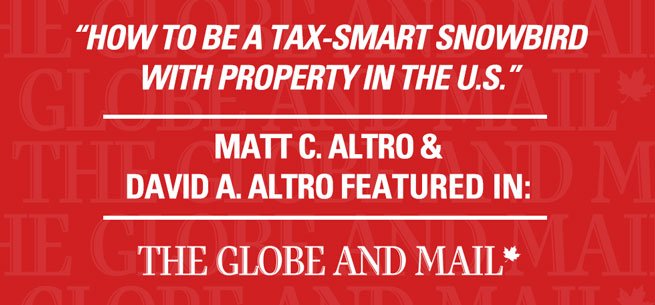We are very pleased to share that David Altro and Matt Altro were asked to prepare a special for The Globe and Mail, which was published on February 22, 2018. Their article titled “How to be a tax-smart snowbird with property in the U.S.” provides a case-study approach for a typical Snowbird purchasing a vacation property in Florida and the various ownership structures and issues which are considered
To read the article you can see it in part below, or click here to view it on The Globe and Mail’s website.
How to be a tax-smart snowbird with property in the U.S.
Matt Altro and David Altro
The Globe and Mail
February 22, 2018
We have heard it said that a real Canadian plays hockey, is polite and pays high taxes. And a smart Canadian? Well, we say that a smart Canadian is a snowbird. Seriously, why remain in Canada during the winter if avoidable? This year, we have experienced bone-chilling cold, high winds and terrible blizzards.
But there are snowbirds and there are smart snowbirds. What’s the difference? A snowbird goes to Florida or another area in the Sunbelt, buys a condo, puts title in their name alone or as a couple, vacations there and believes all is good, which it probably is until something happens.
Remember a familiar saying about death and taxes? So, what happens if a Canadian snowbird passes away owning Florida property?
Probate
Besides the tragedy of the loss of a loved one, the Florida condo becomes one big hassle and expense for the surviving spouse or kids. It’s called probate. It’s the legal procedure required in Probate Court where the U.S. property is located so the property can be legally transferred to the beneficiaries of the deceased, then sold or kept in the family.
Probate always applies when title is solely in the name of the person who has died. Probate is expensive, freezes the estate and ties up the property for eight to 12 months. Court costs, newspaper publications, filing fees and attorney fees run up to 3 per cent to 4 per cent of the market value of the property.

